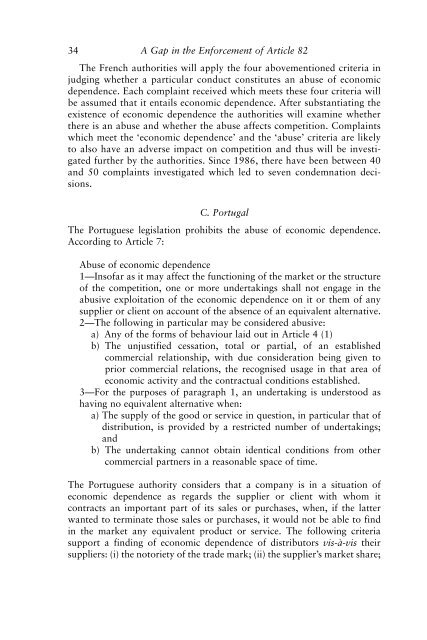Abuse of Economic Dependence - The Centre for European Policy ...
Abuse of Economic Dependence - The Centre for European Policy ...
Abuse of Economic Dependence - The Centre for European Policy ...
Create successful ePaper yourself
Turn your PDF publications into a flip-book with our unique Google optimized e-Paper software.
34 A Gap in the En<strong>for</strong>cement <strong>of</strong> Article 82<br />
<strong>The</strong> French authorities will apply the four abovementioned criteria in<br />
judging whether a particular conduct constitutes an abuse <strong>of</strong> economic<br />
dependence. Each complaint received which meets these four criteria will<br />
be assumed that it entails economic dependence. After substantiating the<br />
existence <strong>of</strong> economic dependence the authorities will examine whether<br />
there is an abuse and whether the abuse affects competition. Complaints<br />
which meet the ‘economic dependence’ and the ‘abuse’ criteria are likely<br />
to also have an adverse impact on competition and thus will be investigated<br />
further by the authorities. Since 1986, there have been between 40<br />
and 50 complaints investigated which led to seven condemnation decisions.<br />
C. Portugal<br />
<strong>The</strong> Portuguese legislation prohibits the abuse <strong>of</strong> economic dependence.<br />
According to Article 7:<br />
<strong>Abuse</strong> <strong>of</strong> economic dependence<br />
1—Ins<strong>of</strong>ar as it may affect the functioning <strong>of</strong> the market or the structure<br />
<strong>of</strong> the competition, one or more undertakings shall not engage in the<br />
abusive exploitation <strong>of</strong> the economic dependence on it or them <strong>of</strong> any<br />
supplier or client on account <strong>of</strong> the absence <strong>of</strong> an equivalent alternative.<br />
2—<strong>The</strong> following in particular may be considered abusive:<br />
a) Any <strong>of</strong> the <strong>for</strong>ms <strong>of</strong> behaviour laid out in Article 4 (1)<br />
b) <strong>The</strong> unjustified cessation, total or partial, <strong>of</strong> an established<br />
commercial relationship, with due consideration being given to<br />
prior commercial relations, the recognised usage in that area <strong>of</strong><br />
economic activity and the contractual conditions established.<br />
3—For the purposes <strong>of</strong> paragraph 1, an undertaking is understood as<br />
having no equivalent alternative when:<br />
a) <strong>The</strong> supply <strong>of</strong> the good or service in question, in particular that <strong>of</strong><br />
distribution, is provided by a restricted number <strong>of</strong> undertakings;<br />
and<br />
b) <strong>The</strong> undertaking cannot obtain identical conditions from other<br />
commercial partners in a reasonable space <strong>of</strong> time.<br />
<strong>The</strong> Portuguese authority considers that a company is in a situation <strong>of</strong><br />
economic dependence as regards the supplier or client with whom it<br />
contracts an important part <strong>of</strong> its sales or purchases, when, if the latter<br />
wanted to terminate those sales or purchases, it would not be able to find<br />
in the market any equivalent product or service. <strong>The</strong> following criteria<br />
support a finding <strong>of</strong> economic dependence <strong>of</strong> distributors vis-à-vis their<br />
suppliers: (i) the notoriety <strong>of</strong> the trade mark; (ii) the supplier’s market share;


